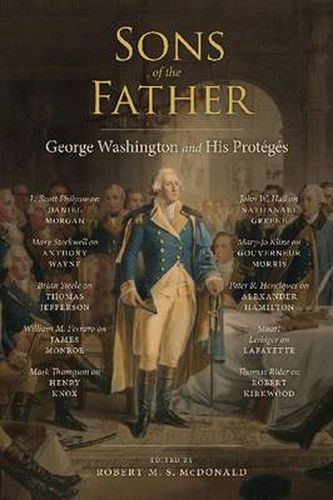Readings Newsletter
Become a Readings Member to make your shopping experience even easier.
Sign in or sign up for free!
You’re not far away from qualifying for FREE standard shipping within Australia
You’ve qualified for FREE standard shipping within Australia
The cart is loading…






Whether acting as a military officer or civilian officeholder, George Washington did not possess a reputation for glad handing, easy confidences, or even much warmth. His greatest attributes as a commander might well have been his firm command over his own emotions and the way in which he held himself above if not apart from the men he led. Understanding the full range of Washington’s leadership, which embraced all shades of persuasion and coercion as well as multiple modes of command and solicitude, requires the examination of his influence on the lives, careers, and characters of the members of a diverse fraternity of younger men.
In Sons of the Father, leading scholars analyse Washington’s relationships with men such as Daniel Morgan, Anthony Wayne, Thomas Jefferson, James Monroe, Henry Knox, Nathanael Greene, Gouverneur Morris, Alexander Hamilton, and the Marquis de Lafayette. The men on whom this volume focuses were not all his closest associates. Yet all are important figures in that their interactions with Washington provide glimpses into various aspects of his capacities for management, motivation, control, and the cultivation of talent. The essays in this volume demonstrate Washington’s consistency in treating all these men differently, for different reasons, at different times. It was perhaps part of his genius to recognise the individuality of the men with whom he interacted as well as the shifting requirements of changing circumstances.
$9.00 standard shipping within Australia
FREE standard shipping within Australia for orders over $100.00
Express & International shipping calculated at checkout
Whether acting as a military officer or civilian officeholder, George Washington did not possess a reputation for glad handing, easy confidences, or even much warmth. His greatest attributes as a commander might well have been his firm command over his own emotions and the way in which he held himself above if not apart from the men he led. Understanding the full range of Washington’s leadership, which embraced all shades of persuasion and coercion as well as multiple modes of command and solicitude, requires the examination of his influence on the lives, careers, and characters of the members of a diverse fraternity of younger men.
In Sons of the Father, leading scholars analyse Washington’s relationships with men such as Daniel Morgan, Anthony Wayne, Thomas Jefferson, James Monroe, Henry Knox, Nathanael Greene, Gouverneur Morris, Alexander Hamilton, and the Marquis de Lafayette. The men on whom this volume focuses were not all his closest associates. Yet all are important figures in that their interactions with Washington provide glimpses into various aspects of his capacities for management, motivation, control, and the cultivation of talent. The essays in this volume demonstrate Washington’s consistency in treating all these men differently, for different reasons, at different times. It was perhaps part of his genius to recognise the individuality of the men with whom he interacted as well as the shifting requirements of changing circumstances.